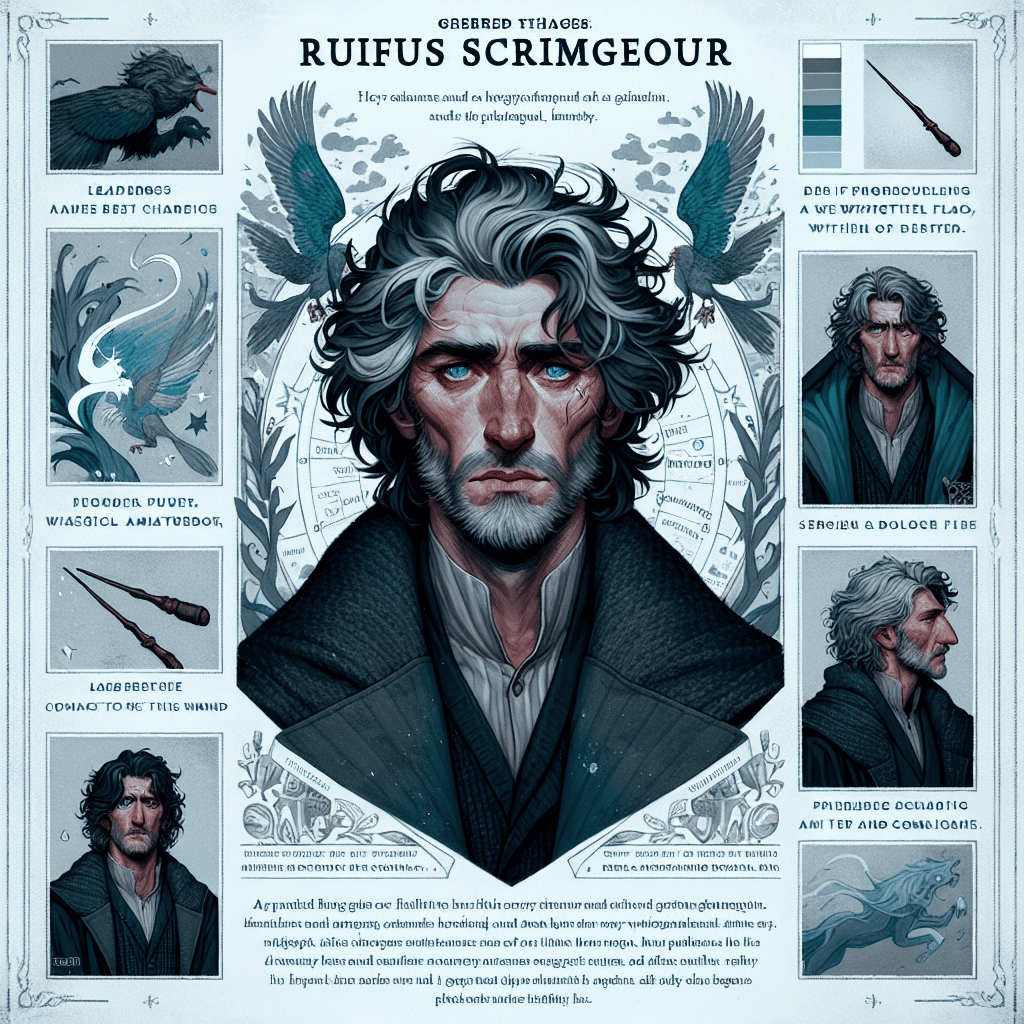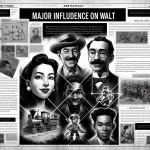-
목차
- Rufus Scrimgeour’s Role in the Wizarding World
- Themes of Leadership and Responsibility in Scrimgeour’s Character
- The Impact of Scrimgeour’s Decisions on the Wizarding Community
- Analyzing Scrimgeour’s Relationships with Key Characters
- The Evolution of Rufus Scrimgeour Throughout the Series
- Scrimgeour as a Symbol of Political Struggle in Harry Potter
- The Moral Ambiguities of Rufus Scrimgeour’s Actions
- Q&A
“Rufus Scrimgeour: The Reluctant Leader in a Time of Darkness.”
Rufus Scrimgeour is a significant character in J.K. Rowling’s “Harry Potter” series, particularly in “Harry Potter and the Half-Blood Prince” and “Harry Potter and the Deathly Hallows.” As the Minister of Magic during a tumultuous period in the wizarding world, Scrimgeour embodies themes of leadership, sacrifice, and the struggle against tyranny. His character reflects the complexities of governance in times of crisis, showcasing the challenges of maintaining order and public trust amidst fear and uncertainty. Scrimgeour’s interactions with key characters, including Harry Potter, reveal his pragmatic approach to leadership, as well as the moral dilemmas faced by those in power. Through his portrayal, Rowling explores the themes of loyalty, the burden of responsibility, and the often-blurred lines between right and wrong in the fight against dark forces.
Rufus Scrimgeour’s Role in the Wizarding World
Rufus Scrimgeour, a prominent figure in the Harry Potter series, serves as the Minister for Magic during a tumultuous period in the wizarding world. His character embodies the complexities of leadership in times of crisis, reflecting the broader themes of power, responsibility, and the moral dilemmas faced by those in authority. Scrimgeour’s tenure as Minister is marked by the rise of Voldemort and the ensuing chaos that grips both the magical and non-magical communities. As the series progresses, his role becomes increasingly significant, illustrating the challenges of governance when faced with an overwhelming threat.
Initially introduced in “Harry Potter and the Half-Blood Prince,” Scrimgeour is depicted as a rugged, battle-hardened leader, having previously served as head of the Auror Office. His experience in law enforcement lends him a certain gravitas, yet it also highlights the limitations of his approach to leadership. Scrimgeour’s attempts to maintain order and instill confidence in the wizarding community often come across as politically motivated rather than genuinely protective. This duality in his character raises questions about the nature of authority and the ethical responsibilities of those who wield it.
As the series unfolds, Scrimgeour’s interactions with Harry Potter and his friends reveal his pragmatic, sometimes ruthless, approach to governance. He seeks to use Harry as a symbol of hope, believing that the young wizard’s fame can rally the community against Voldemort. However, this manipulation underscores a critical theme: the exploitation of individuals for political gain. Scrimgeour’s willingness to prioritize public perception over personal integrity illustrates the moral compromises that leaders may make in their pursuit of power and stability.
Moreover, Scrimgeour’s character serves as a foil to other leaders in the series, particularly Albus Dumbledore. While Dumbledore embodies wisdom, compassion, and a deep understanding of the complexities of good and evil, Scrimgeour often resorts to fear tactics and propaganda. This contrast emphasizes the varying philosophies of leadership within the wizarding world, prompting readers to consider the effectiveness of different approaches in times of crisis. Scrimgeour’s reliance on fear ultimately proves inadequate, as the threat of Voldemort looms larger, revealing the limitations of his strategies.
In addition to his political maneuvers, Scrimgeour’s character arc also highlights the theme of sacrifice. As the series progresses, he becomes increasingly aware of the dire consequences of his decisions. His eventual fate serves as a poignant reminder of the personal costs associated with leadership. In “Harry Potter and the Deathly Hallows,” Scrimgeour’s death at the hands of Voldemort’s followers underscores the brutal reality of the conflict and the vulnerability of even the most powerful figures in the wizarding world.
Ultimately, Rufus Scrimgeour’s role in the Harry Potter series encapsulates the complexities of leadership during a time of crisis. His character illustrates the delicate balance between power and responsibility, as well as the ethical dilemmas faced by those in authority. Through his interactions with Harry and the broader wizarding community, Scrimgeour’s story serves as a cautionary tale about the perils of manipulation and the importance of integrity in leadership. As readers navigate the intricacies of his character, they are invited to reflect on the broader implications of governance, sacrifice, and the moral choices that define the human experience, even in a world filled with magic.
Themes of Leadership and Responsibility in Scrimgeour’s Character
Rufus Scrimgeour, a prominent character in the Harry Potter series, embodies the complex themes of leadership and responsibility, particularly in the context of a society under threat. As the Minister of Magic during a tumultuous period marked by the rise of Voldemort and the Death Eaters, Scrimgeour’s character serves as a lens through which the intricacies of leadership are examined. His tenure is characterized by the weight of responsibility that comes with holding a position of power, especially in times of crisis.
Scrimgeour’s leadership style is often scrutinized, revealing the challenges faced by those in authority when navigating moral dilemmas. He is portrayed as a pragmatic leader, willing to make difficult decisions for the greater good, yet his methods sometimes raise ethical questions. For instance, his willingness to use fear as a tool to maintain order reflects a utilitarian approach to governance. This aspect of his character highlights a significant theme: the balance between maintaining security and upholding moral integrity. Scrimgeour’s actions prompt readers to consider the sacrifices leaders must make and the potential consequences of prioritizing safety over ethical considerations.
Moreover, Scrimgeour’s character illustrates the theme of accountability in leadership. As the wizarding world descends into chaos, he is faced with the daunting task of uniting a fractured community. His attempts to rally support often come across as desperate, revealing the inherent difficulties in leading a populace that is divided and fearful. This struggle underscores the notion that true leadership requires not only authority but also the ability to inspire trust and confidence among followers. Scrimgeour’s interactions with key characters, such as Harry Potter, further emphasize this theme. His insistence on using Harry as a symbol of hope, despite Harry’s reluctance, showcases the burdens leaders bear in representing their communities.
In addition to accountability, Scrimgeour’s character also embodies the theme of sacrifice. Throughout the series, he is depicted as a leader who is willing to put himself at risk for the sake of others. This willingness to sacrifice personal safety for the welfare of the wizarding community is a testament to his commitment to his role. However, it also raises questions about the limits of responsibility. Scrimgeour’s ultimate fate serves as a poignant reminder that even the most dedicated leaders can fall victim to the very forces they seek to combat. His demise illustrates the harsh reality that leadership often comes with significant personal costs, a theme that resonates throughout the narrative.
Furthermore, Scrimgeour’s character arc invites reflection on the nature of legacy in leadership. As he grapples with the consequences of his decisions, readers are prompted to consider how leaders are remembered and the impact of their choices on future generations. Scrimgeour’s efforts to protect the wizarding world, despite their shortcomings, contribute to a broader discussion about the complexities of legacy. His character serves as a reminder that leadership is not merely about achieving success but also about navigating the moral landscape that defines one’s tenure.
In conclusion, Rufus Scrimgeour’s character encapsulates the multifaceted themes of leadership and responsibility within the Harry Potter series. Through his pragmatic approach, struggles with accountability, willingness to sacrifice, and reflections on legacy, Scrimgeour offers a nuanced portrayal of what it means to lead in times of crisis. His journey invites readers to engage with the moral complexities inherent in leadership, ultimately enriching the narrative’s exploration of power and its implications in a world fraught with danger.
The Impact of Scrimgeour’s Decisions on the Wizarding Community
Rufus Scrimgeour, as the Minister of Magic during a tumultuous period in the wizarding world, made decisions that significantly impacted the community. His tenure was marked by the rise of Voldemort and the Death Eaters, which necessitated a response that would shape the future of the wizarding society. Scrimgeour’s approach to governance was characterized by a blend of pragmatism and a desire to maintain order, yet his choices often sparked controversy and debate among the wizarding populace.
One of the most notable impacts of Scrimgeour’s decisions was the implementation of stringent security measures. In response to the increasing threat posed by Voldemort, he prioritized the safety of the wizarding community, which included enhancing protections around key locations such as the Ministry of Magic and Hogwarts. While these measures were intended to safeguard citizens, they also led to a climate of fear and suspicion. The heightened security protocols often resulted in the harassment of innocent witches and wizards, creating a divide between the Ministry and the very people it sought to protect. This tension illustrated the delicate balance Scrimgeour attempted to maintain between security and civil liberties, a challenge that ultimately proved to be a significant aspect of his legacy.
Moreover, Scrimgeour’s decisions regarding communication with the public further complicated his relationship with the wizarding community. He often resorted to propaganda, attempting to bolster morale through carefully crafted messages that emphasized the Ministry’s efforts against Voldemort. However, this approach was met with skepticism, as many citizens felt that the Ministry was not being entirely truthful about the severity of the situation. The disconnect between Scrimgeour’s portrayal of events and the lived experiences of the community fostered a sense of distrust. As a result, many wizards and witches began to question the effectiveness of the Ministry, leading to a decline in public confidence that would have lasting repercussions.
In addition to these challenges, Scrimgeour’s handling of the Order of the Phoenix also had significant implications for the wizarding community. While he recognized the importance of the Order in combating Voldemort, his reluctance to fully support them created friction. Scrimgeour’s insistence on maintaining a degree of control over the Order’s operations reflected his desire to assert the Ministry’s authority. However, this approach alienated key figures within the Order, including Harry Potter, who felt that Scrimgeour was more concerned with public image than genuine collaboration. This estrangement not only weakened the fight against Voldemort but also highlighted the complexities of leadership during a crisis.
Furthermore, Scrimgeour’s decisions regarding the treatment of Muggle-borns and other marginalized groups within the wizarding community revealed the underlying prejudices that persisted during his time in office. His administration’s policies often reflected a reluctance to confront these biases, which ultimately exacerbated divisions within the community. The failure to address these issues not only undermined the unity needed to combat the rising threat but also perpetuated a culture of discrimination that would take years to dismantle.
In conclusion, Rufus Scrimgeour’s decisions as Minister of Magic had profound and far-reaching effects on the wizarding community. His attempts to balance security with civil liberties, manage public perception, and navigate complex relationships with key groups ultimately shaped the landscape of the wizarding world during a critical period. While his intentions may have been rooted in a desire to protect, the consequences of his actions often led to division and distrust, leaving a complicated legacy that would resonate long after his tenure.
Analyzing Scrimgeour’s Relationships with Key Characters
Rufus Scrimgeour, the Minister of Magic during a tumultuous period in the Harry Potter series, serves as a complex character whose relationships with key figures illuminate the broader themes of power, loyalty, and the struggle against tyranny. His interactions with prominent characters such as Harry Potter, Albus Dumbledore, and Severus Snape reveal the intricacies of his role as a leader in a time of crisis, as well as the moral ambiguities that accompany the pursuit of authority.
Scrimgeour’s relationship with Harry Potter is particularly significant, as it encapsulates the tension between the Ministry of Magic and the young hero. Initially, Scrimgeour seeks to leverage Harry’s fame to bolster the Ministry’s image, believing that aligning himself with the Boy Who Lived will enhance public confidence in his leadership. However, this relationship quickly becomes strained as Harry resists being used as a political pawn. Scrimgeour’s attempts to manipulate Harry highlight his pragmatic approach to governance, yet they also reveal a fundamental misunderstanding of Harry’s values. While Scrimgeour is focused on maintaining order and control, Harry embodies the spirit of resistance and individual agency. This clash underscores the theme of power dynamics, illustrating how authority can often lead to alienation rather than unity.
Moreover, Scrimgeour’s relationship with Albus Dumbledore is marked by a complex interplay of respect and rivalry. As a former head of the Ministry, Dumbledore represents an ideal of leadership that Scrimgeour aspires to emulate, yet he also poses a challenge to Scrimgeour’s authority. Dumbledore’s enigmatic nature and his commitment to the fight against Voldemort often place him at odds with the Ministry’s more bureaucratic and cautious approach. Scrimgeour’s attempts to assert his authority in the face of Dumbledore’s influence reveal his insecurities and the pressures he faces as a leader. This dynamic illustrates the theme of loyalty, as Scrimgeour grapples with the need to uphold the Ministry’s interests while recognizing the importance of Dumbledore’s vision for a united front against dark forces.
In contrast, Scrimgeour’s relationship with Severus Snape is fraught with suspicion and manipulation. As the series progresses, Scrimgeour’s reliance on Snape as a source of information about Voldemort’s plans reflects his desperation and the precariousness of his position. While Scrimgeour seeks to use Snape to gain an advantage, he remains wary of the Potions Master’s true loyalties. This relationship highlights the theme of trust, as Scrimgeour’s inability to fully trust Snape ultimately undermines his efforts to combat the rising threat of Voldemort. The tension between them serves as a reminder of the complexities inherent in alliances formed under duress, where motives are often obscured by the shadows of past actions.
In conclusion, Rufus Scrimgeour’s relationships with key characters in the Harry Potter series reveal the multifaceted nature of leadership during times of crisis. Through his interactions with Harry Potter, Albus Dumbledore, and Severus Snape, Scrimgeour embodies the struggles of authority, loyalty, and trust. These relationships not only illuminate his character but also serve as a microcosm of the broader themes that permeate the series, ultimately reflecting the moral dilemmas faced by those in positions of power. As the narrative unfolds, Scrimgeour’s complexities become emblematic of the challenges inherent in navigating a world fraught with danger and uncertainty.
The Evolution of Rufus Scrimgeour Throughout the Series
Rufus Scrimgeour, introduced in J.K. Rowling’s “Harry Potter” series, serves as a complex character whose evolution reflects the broader themes of power, responsibility, and the moral ambiguities of leadership. Initially appearing in “Harry Potter and the Half-Blood Prince,” Scrimgeour is portrayed as the Minister of Magic, a position that places him at the forefront of the wizarding world’s response to the rising threat of Voldemort and his followers. His character embodies the struggle between maintaining order and addressing the growing chaos that envelops the magical community.
As the series progresses, Scrimgeour’s character becomes increasingly multifaceted. He is depicted as a pragmatic leader, willing to make difficult decisions in the face of adversity. However, his approach often raises questions about the ethical implications of his choices. For instance, his insistence on using Harry Potter as a symbol of hope, while simultaneously manipulating public perception, highlights the tension between public duty and personal integrity. This duality in Scrimgeour’s character serves to illustrate the broader theme of the sacrifices leaders must make, often at the expense of their own values.
Moreover, Scrimgeour’s evolution is marked by his interactions with key characters, particularly Harry, Hermione, and Ron. Initially, he seeks to leverage Harry’s fame to bolster the Ministry’s image, demonstrating a willingness to exploit personal relationships for political gain. However, as the narrative unfolds, it becomes evident that Scrimgeour’s motivations are not solely self-serving; he genuinely believes in the necessity of unity against Voldemort’s forces. This belief is further complicated by his recognition of the limitations of his power, as he grapples with the reality that the Ministry cannot single-handedly combat the dark forces threatening their world.
Transitioning into “Harry Potter and the Deathly Hallows,” Scrimgeour’s character faces significant challenges that further illuminate his evolution. The Ministry, under his leadership, becomes increasingly authoritarian, reflecting the desperation of a government struggling to maintain control in the face of overwhelming fear. Scrimgeour’s attempts to assert authority often backfire, leading to a loss of public trust and further complicating his role as a leader. This shift underscores the theme of the fragility of power, as even the most well-intentioned leaders can falter when confronted with insurmountable challenges.
Ultimately, Scrimgeour’s fate serves as a poignant commentary on the consequences of leadership in times of crisis. His death at the hands of Voldemort’s followers marks a tragic culmination of his journey, illustrating the harsh realities faced by those in positions of authority. In his final moments, Scrimgeour’s commitment to the fight against darkness is evident, revealing a character who, despite his flaws, embodies the struggle for justice and the complexities of moral choice.
In conclusion, Rufus Scrimgeour’s evolution throughout the “Harry Potter” series encapsulates the intricate interplay between power, responsibility, and ethical dilemmas. His character serves as a lens through which readers can explore the challenges of leadership in a world fraught with danger and uncertainty. As Scrimgeour navigates the treacherous waters of political maneuvering and personal sacrifice, he ultimately becomes a symbol of the broader themes that permeate Rowling’s narrative, reminding us of the weighty responsibilities borne by those who seek to lead in tumultuous times.
Scrimgeour as a Symbol of Political Struggle in Harry Potter
Rufus Scrimgeour, the Minister of Magic during a tumultuous period in the Harry Potter series, serves as a compelling symbol of political struggle and the complexities of leadership in times of crisis. His character embodies the challenges faced by those in power when confronted with external threats and internal dissent. Scrimgeour’s tenure is marked by the rise of Voldemort and the Death Eaters, which forces him to navigate a landscape fraught with fear, uncertainty, and moral ambiguity. As the wizarding world descends into chaos, Scrimgeour’s actions and decisions reflect the broader themes of governance, responsibility, and the often-blurred lines between right and wrong.
Initially, Scrimgeour presents himself as a strong leader, determined to combat the growing influence of dark forces. His public persona is that of a resolute figure, willing to take decisive action against Voldemort’s followers. However, as the series progresses, it becomes evident that his leadership is not without its flaws. Scrimgeour’s reliance on propaganda and fear tactics to maintain control reveals the precarious nature of his authority. This approach highlights a significant theme within the narrative: the struggle between security and freedom. Scrimgeour’s willingness to compromise civil liberties in the name of safety raises questions about the ethical implications of governance during crises.
Moreover, Scrimgeour’s interactions with key characters, particularly Harry Potter, further illuminate his role as a political figure. When he seeks Harry’s endorsement to bolster his credibility, it becomes clear that he is more concerned with public perception than genuine leadership. This moment underscores the theme of manipulation in politics, as Scrimgeour attempts to use Harry’s fame to legitimize his position. However, Harry’s rejection of Scrimgeour’s overtures signifies a deeper disillusionment with authority figures who prioritize their image over the welfare of the community. This dynamic illustrates the tension between individual agency and institutional power, a recurring motif throughout the series.
As the narrative unfolds, Scrimgeour’s character becomes increasingly complex. His attempts to maintain order often lead to morally questionable decisions, such as the use of the Muggle-born Registration Commission, which serves to marginalize and persecute a segment of the population. This aspect of his leadership reflects the theme of prejudice and the ease with which societies can devolve into discrimination under the guise of governance. Scrimgeour’s failure to recognize the humanity of those he deems a threat ultimately contributes to his downfall, emphasizing the importance of empathy and understanding in leadership.
In the end, Scrimgeour’s tragic fate serves as a poignant reminder of the consequences of political struggle. His assassination at the hands of Voldemort’s followers underscores the brutal reality of a world where power is often wielded without regard for justice or morality. This outcome not only highlights the dangers of authoritarianism but also reinforces the notion that true leadership requires more than mere strength; it demands integrity, compassion, and a commitment to the greater good. Thus, Rufus Scrimgeour stands as a multifaceted symbol of political struggle within the Harry Potter series, embodying the complexities and challenges that accompany the pursuit of power in a world rife with conflict and division. Through his character, readers are invited to reflect on the nature of authority and the ethical dilemmas that arise in the face of adversity, making Scrimgeour a significant figure in the broader narrative of the series.
The Moral Ambiguities of Rufus Scrimgeour’s Actions
Rufus Scrimgeour, the former Minister of Magic in J.K. Rowling’s Harry Potter series, embodies a complex character whose actions raise significant moral questions. As the wizarding world grapples with the resurgence of dark forces, Scrimgeour’s decisions reflect the difficult balance between duty and ethics. His tenure is marked by a series of choices that, while aimed at preserving the safety of the wizarding community, often blur the lines between right and wrong. This moral ambiguity is particularly evident in his approach to leadership during a time of crisis.
Initially, Scrimgeour is portrayed as a pragmatic leader, willing to make tough decisions in the face of overwhelming danger. His commitment to combating Voldemort and his followers is commendable; however, this commitment often leads him to adopt questionable tactics. For instance, his willingness to use fear as a tool to maintain order raises ethical concerns. Scrimgeour’s public speeches, which emphasize the threat posed by dark wizards, serve to rally the community but also instill a sense of paranoia. This manipulation of public sentiment illustrates a fundamental moral dilemma: is it justifiable to sacrifice individual freedoms for the sake of collective security?
Moreover, Scrimgeour’s interactions with Harry Potter further highlight his moral complexities. While he recognizes Harry’s significance in the fight against Voldemort, he also seeks to exploit Harry’s fame for political gain. This duality in Scrimgeour’s character reveals a leader who is torn between genuine concern for the greater good and a desire for personal power. His attempts to persuade Harry to become a public figure in the war effort underscore the tension between using individuals as symbols of hope and respecting their autonomy. In this context, Scrimgeour’s actions can be seen as both strategic and self-serving, prompting readers to question the ethical implications of his leadership style.
Additionally, Scrimgeour’s handling of the Order of the Phoenix and its members further complicates his moral standing. While he acknowledges the importance of the Order in the fight against Voldemort, he simultaneously exhibits a lack of trust in their methods. This skepticism leads him to adopt a more authoritarian approach, which alienates key figures in the resistance. By prioritizing control over collaboration, Scrimgeour risks undermining the very alliances necessary to combat the dark forces threatening the wizarding world. This raises another critical question: can effective leadership exist without trust and cooperation?
As the narrative unfolds, Scrimgeour’s ultimate fate serves as a poignant commentary on the consequences of his moral choices. His demise at the hands of Voldemort’s followers underscores the peril of compromising one’s principles in the pursuit of power. In the end, Scrimgeour’s character arc invites readers to reflect on the complexities of leadership in times of crisis. His actions, while often rooted in a desire to protect, reveal the inherent dangers of moral ambiguity. The struggle between ethical integrity and the demands of leadership remains a timeless theme, resonating with contemporary discussions about governance and responsibility.
In conclusion, Rufus Scrimgeour’s character serves as a compelling exploration of the moral ambiguities that arise in positions of power. His decisions, driven by a mix of pragmatism and ambition, challenge readers to consider the ethical implications of leadership in the face of adversity. Ultimately, Scrimgeour’s legacy is a reminder that the path to security is fraught with difficult choices, and the pursuit of the greater good can sometimes lead to morally questionable outcomes.
Q&A
1. **Who is Rufus Scrimgeour?**
Rufus Scrimgeour is the Minister of Magic in the Harry Potter series, particularly prominent in “Harry Potter and the Half-Blood Prince” and “Harry Potter and the Deathly Hallows.”
2. **What is Scrimgeour’s primary role in the story?**
Scrimgeour’s primary role is to lead the Ministry of Magic during a time of crisis, as Voldemort and his followers gain power, and to manage the wizarding community’s response to the threat.
3. **What themes are associated with Rufus Scrimgeour?**
Key themes associated with Scrimgeour include the struggle for power, the complexities of leadership during crises, and the moral ambiguities of governance in the face of evil.
4. **How does Scrimgeour’s character develop throughout the series?**
Scrimgeour evolves from a somewhat pragmatic leader focused on public image to a more desperate figure who recognizes the severity of the threat posed by Voldemort, ultimately sacrificing his life for the cause.
5. **What are Scrimgeour’s views on Harry Potter?**
Scrimgeour initially sees Harry as a symbol of hope and a tool for rallying public support, but their relationship becomes strained as Harry resists being used for political purposes.
6. **What is Scrimgeour’s fate in the series?**
Rufus Scrimgeour is killed by Voldemort’s followers, highlighting the dangers faced by those in power and the ultimate futility of his efforts to maintain control in a time of chaos.
7. **How does Scrimgeour’s leadership style reflect the challenges of the wizarding world?**
Scrimgeour’s leadership style reflects a mix of pragmatism and desperation, illustrating the difficulties of maintaining authority and moral integrity in a world where fear and manipulation are prevalent.Rufus Scrimgeour, a character in J.K. Rowling’s “Harry Potter” series, serves as the Minister for Magic during a tumultuous period marked by the rise of Voldemort and the Death Eaters. His character embodies themes of leadership, sacrifice, and the struggle between authority and morality. Scrimgeour’s pragmatic approach to governance often clashes with the ideals of Harry and his friends, highlighting the complexities of power in times of crisis. Ultimately, his character arc reflects the challenges faced by leaders in maintaining order while confronting the darker aspects of their society. Scrimgeour’s legacy is one of a flawed leader who, despite his shortcomings, seeks to protect the wizarding world in a time of great peril.







